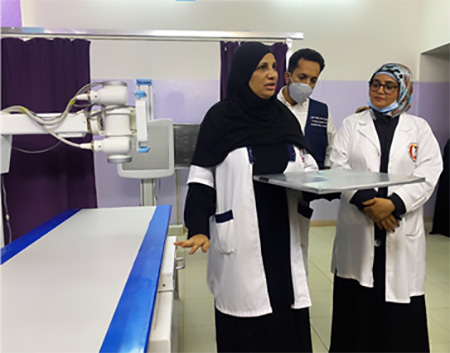 General Director of Al-Sadaqah Hospital Dr Kefaya Al-Gazaie, Manager of the Radiology Department Dhikra Abdulraheem and WHO Technical Officer Dr Amgad Abdulqawi discuss the impact that the new digital x-ray machine will have on the population of Aden and surrounding governoratesAden, 5 December 2021 – With the crisis in Yemen profoundly impacting the country's health system, WHO is strengthening service delivery at hospitals across the country through the World Bank-supported Emergency Health and Nutrition Project (EHNP). One such facility is Al-Sadaqah Hospital in Aden where, after 19 years of relying on an increasingly outdated and underperforming x-ray machine, the hospital staff finally received a new one.
General Director of Al-Sadaqah Hospital Dr Kefaya Al-Gazaie, Manager of the Radiology Department Dhikra Abdulraheem and WHO Technical Officer Dr Amgad Abdulqawi discuss the impact that the new digital x-ray machine will have on the population of Aden and surrounding governoratesAden, 5 December 2021 – With the crisis in Yemen profoundly impacting the country's health system, WHO is strengthening service delivery at hospitals across the country through the World Bank-supported Emergency Health and Nutrition Project (EHNP). One such facility is Al-Sadaqah Hospital in Aden where, after 19 years of relying on an increasingly outdated and underperforming x-ray machine, the hospital staff finally received a new one.
Hospitals in Yemen are struggling to meet the increasing demands for essential care, coupled with deteriorating infrastructure, equipment and services. "Since 2002, we had been working with another x-ray machine that insufficiently diagnosed cases, forcing many patients to go to an expensive private clinic,” said Dhikra Abdulraheem, Manager of the Hospital’s Radiology Department.
The state-of-the art, digital x-ray machine is already enabling the hospital’s pediatric department to better treat a growing influx of patients. “Now, instead of paying five times more at a private clinic, they can receive the same accurate diagnosis at a much more affordable cost,” added Abdulraheem.
Improved image diagnostic capacity will enable doctors to effectively detect severe acute lower respiratory tract infections, which will reduce the risk of infection-related mortality in children under five.
Abdulraheem elaborated that the machine will also diagnose adult cases, which is key to meeting the needs of an ever-growing number of patients -- including internally displaced people -- hailing from many different governorates. “We have suffered a long time, especially during the last four years of this seven-year conflict,” added Abdulraheem, “Now, thanks to the arrival of this new x-ray machine, we can finally treat more patients.”




